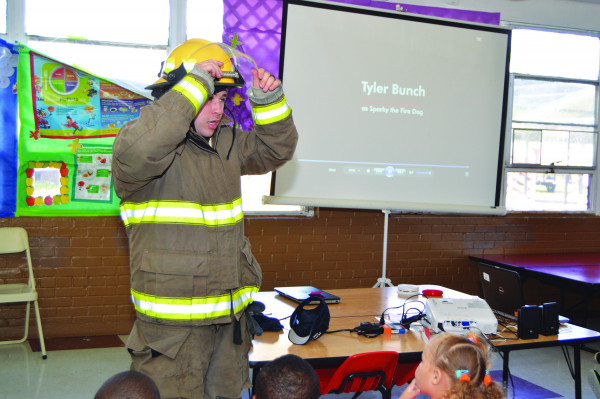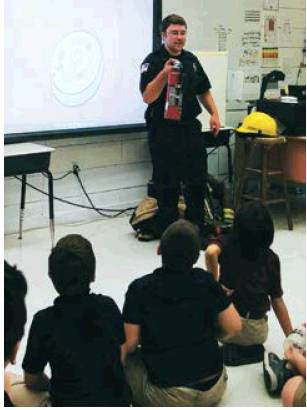LOOK, LISTEN AND LEARN


Today’s home fires burn faster than ever. In a typical fire, one may have as little as one to two minutes to escape safely from the time the smoke alarm sounds.
The National Fire Protection Agency (NFPA) has deemed October 7-13 as National Fire Prevention Week and local fire departments across the U.S. are working to educate the public on fire prevention.
Jennings Fire Department (JFD) Prevention Officer Hunter Crader, who has 10 years of experience as a firefighter, said that this week his department visited Jennings schools around the city in an effort to educate the community and promote awareness around fire safety.
“We have learned that it helps to educate the children in addition to the adults to be prepared in the unfortunate event of a fire,” Crader said. “We teach the children to be aware of their surroundings and how to call 911 in an emergency. We want them to be able to act instinctively and quickly in the event of a fire and we find this helps them learn what to do so they don’t panic.”
This year’s theme for the national campaign is “Look. Listen. Learn. Be Aware. Fire Can Happen Anywhere,” which focuses on essential ways to prevent, but also quickly and safely escape home fires, according to the Louisiana State Fire Marshal’s Office.
Crader said the campaign focuses on “looking” for places fire could start, “listening” for the sound of a smoke alarm and “learning” two ways out of every room in your home.
“Look around your home for fire hazards and take the necessary steps to fix them,” Crader said. “Learn two ways out of every room, and have an outside meeting place a safe distance in front of your home where everyone can meet. Listen for the sound of the smoke alarm, and when it sounds, get outside and stay outside.”
According to NFPA, the death rate per 1,000 home fires that are reported to fire departments was 10 percent higher in 2016 than in 1980. Cooking was the leading cause of home fires and home fire injuries and the second leading cause of home fire deaths. Smoking has been the leading cause of home fire deaths for the last several decades.
Crader would like to remind the public to cook with caution.
“Keep anything that can catch on fire, such as oven mitts, wooden utensils, towels or curtains, away from the stove top,” he said. “Also, in the event of a grease fire, smother the flames by sliding a lid over the pan and leave the pan covered until it is completely cooled. Also make sure pot handles are turned inward to avoid being knocked off by a passerby.”
He also reminds residents to use caution when handling hot oil used for cooking.
“Do not move a pot of hot grease,” he said. “Cover it and let it cool with the heat turned off. The majority of fires happen when people panic and try to move a cooking vessel in a hurry.”
He also recommends that resident rope off a kidfree zone at least three feet around the stove and areas where hot food or drink is prepared or carried.
According to NFPA, roughly three out of five deaths happen in homes with no working smoke alarms. Smoke alarms should be installed inside every sleeping room, outside each separate sleeping area and on every floor level.
Many alarms are hooked up to the homes electrical system, but in the event of an electrical fire, a battery backup can help save lives.
“A working smoke detector is a lifesaver,” said Crader. “Everyone should have a working and batteryoperated smoke alarm.”
Crader recommends pushing the test button often to make sure each alarm is working.
“We recommend checking the battery once a month and replacing them twice a year,” Crader said. “An easy way to remember is to change them each year during Daylight Saving Time.”
Fire extinguishers should also be installed at least six feet away from the oven, but should still be within reach of the kitchen area, since most fires in the home begin in that area, Crader said.
“Don’t shove it in the back of the cabinet where you might forget it,” he said.
Half of home heating fires are reported during the months of December, January and February, according to NFPA.
“Be sure you have at least three feet of distance cleared around space heaters,” Crader said. “Also make sure all gas heaters and well-vented and have clean filters.”
Crader also recommends contacting a local service technician to come out and test heating systems to make sure they are in working order before the cooler weather arrives.
With the increase in electronic devices in the home these days, following the proper safety precautions when using electrical cords is critical.
“Never run an electrical cord under a rug and always use the proper extension cord for your outlets and don’t overload them,” he said. “Also when purchasing electrical cords, smoke alarms or any other fire prevention devices, be sure to look for the Underwriters Laboratories (UL) stamp so you know the product has been tested and approved for safety.”
With how quickly a fire can spread, it’s a good idea to plan ahead and create a game plan to protect your family in the event of a fire.
It can be helpful to draw a map of your home with escape routes showing all doors and windows, Crader said. Also, make sure all windows and doors open easily so that you can use them to escape.
Pick a meeting place outside, preferably in front of the home where everyone should meet. Talk about your plan with everyone in the home and take the time to hold a practice fire drill at least twice a year so that you will be prepared in the unfortunate event a fire at the residence.
A worksheet is available at www.nfpa.org/factsheets to help you and your family create an escape plan. For safety tips and more information about Fire Prevention Week, visit www.firepreventionweek.org.
NFPA statistics show that the number of U.S. home fires has been steadily declining over the past few decades. Jennings Fire Chief Hulin Theriot said he believes this is the result of better education efforts along with more stringent fire codes.
“The codes have gotten much stricter over the years,” Theriot said, “We learned a lot of lessons from Hurricanes Rita and Katrina. There is better training available for inspectors and the homes today are much better built thanks to the updated codes.”
In the future, Theriot said he believes that sprinkler systems should become mandatory, which is currently a requirement in most commercial buildings.
“Sprinkler systems are not yet mandatory, but they have proven to be a huge in preventing fires and saving lives,” Theriot said. “They may cost more money, but they pay off big time by saving lives and property.”
Theriot also said elderly residents on a fixed income may qualify for a free smoke alarm plus installation by contacting the Louisiana State Fire Marshal’s Office.
Residents can also request for fire department personnel to come out and inspect their home to assess any safety hazards by calling the fire department at (337) 821-5507.
